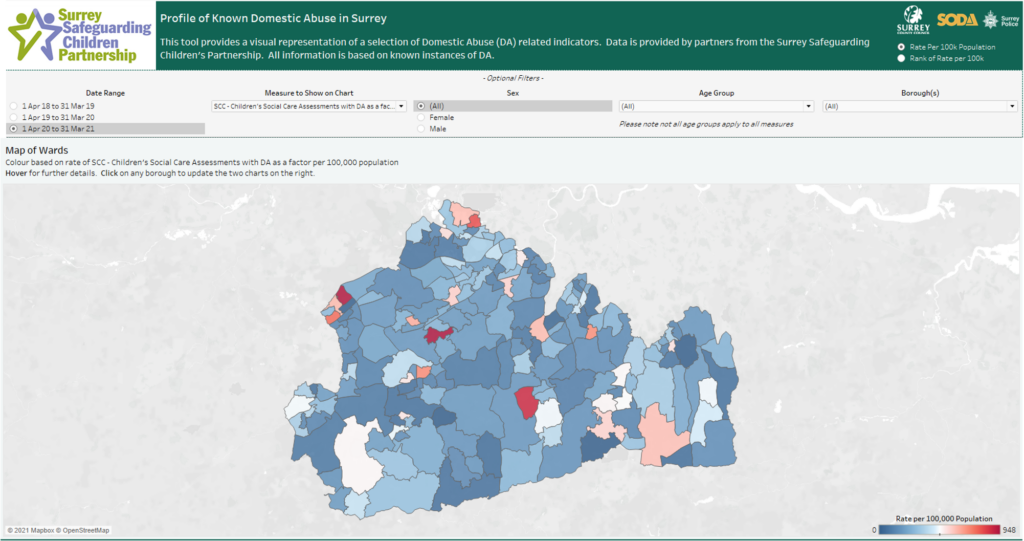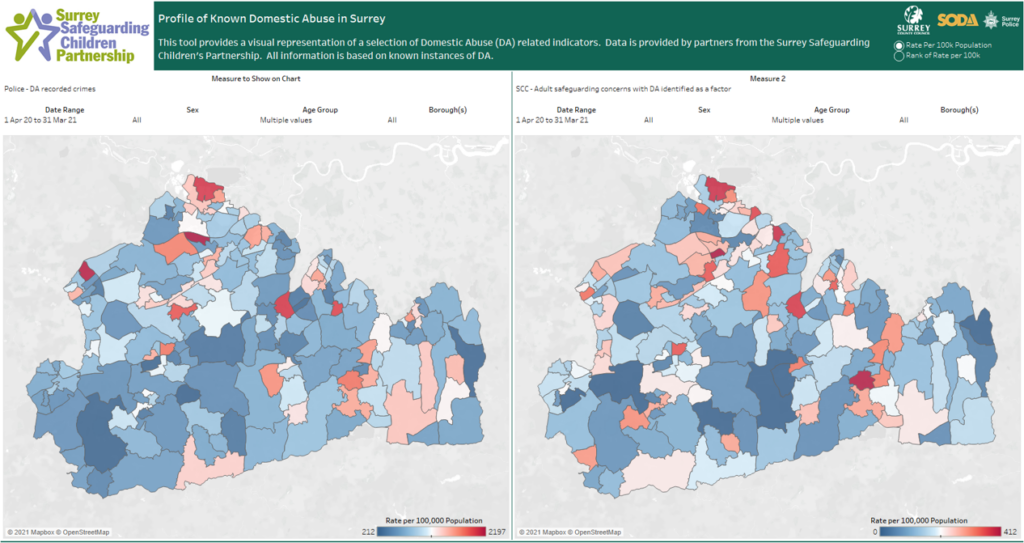Domestic abuse: piecing the information puzzle together
Sharing data to improve support for domestic abuse survivors in Surrey.
Statistics on domestic abuse are produced separately by a number of different organisations in England and Wales. When taken in isolation, these statistics may not provide the context required to understand the national and local picture of domestic abuse.
Introduction
The Surrey Office of Data Analytics (SODA) has been working with partners to create a shared view of Domestic Abuse incidents and referrals across Surrey.
The aim of the project was to test how data collaboration can support decision makers from different agencies in the identification of groups and areas of work where multi-agency response can be improved. This would be either through new and targeted interventions or more intelligent long-term commissioning, with a view that this will lead to better outcomes for survivors of domestic abuse and their dependents, as well as better use of limited public resources.
Why did we do this?
Domestic abuse remains one of the most significant issues within statutory social work practice today, featuring in over 50% of Serious Case Reviews and making up a significant proportion of casework across all Children’s Services departments. This is a wicked problem, and despite multi-agency work existing through the Multi-Agency Risk Assessment Conferences (MARAC) and other networks, it is often difficult for local public bodies to coordinate and share information for purposes of planning and joint delivery of provision rather than safeguarding and direct care.
This lack of high-level, data-driven coordination can generate a lack of consistently jointly planned, high-quality response across all agencies and prevent the efficient use of resources through avoidance of duplication. This project aimed to demonstrate that it is possible, and indeed desirable, for organisations involved in the DA response system to share aggregated data for planning purposes, as this can support agencies with developing an understanding of shared priorities without relying on a partial view of the system and limited data.
Partnerships and pathways between agencies are vital in combining packages of support to ensure that survivors’ range of support needs are met. Domestic abuse has impacts across criminal justice, health, child protection, education, housing, employment and many more areas. A coordinated response across statutory agencies, in partnership with specialist services, is therefore vital.
Transforming the response to Domestic Abuse Consultation. Response from Women’s Aid, May 2018
What did we do?
Adopting an outcome-based methodology for data projects
A discovery phase was launched in April 2021 to investigate how data analytics could help SODA partners tackle the issue of domestic abuse. We adopted LOTI’s outcome-based methodology for data projects, to ensure that at the end of the process we would have something that could lead to better actions.
In May 2021 we conducted a workshop with several stakeholders from different areas, including people from policy and strategy, data and insight, services and frontline staff, information governance specialists and academics in the field.
Instead of starting with the data, we asked participants to think about what they could do differently if they had better information. We wanted to understand what insight and information they were currently lacking about domestic-related phenomena (e.g., contacts to Children Single Point of Access, police incidents, referrals to outreach, GP concerns, etc.) that would allow them to make better decisions.
The group voiced the need to identify groups and areas of work where the multi-agency response can be collaboratively improved, either through new and targeted interventions or more intelligent long-term commissioning, with a view that this will lead to better outcomes for survivors of domestic abuse and their dependents, as well as better use of limited public resources. As a result of the workshop, a proof-of-concept dashboard was developed on Tableau.
The tool
This tool provides a multi-agency understanding of Domestic Abuse in Surrey bringing together datasets that individual organisations and agencies have contributed. The following agencies have already provided data that has been included and is available in the tool
- Surrey County Council Childrens’ Social Care
- Surrey County Council Adults’ Social Care
- Surrey Police
Further services and organisations have been contacted to explore their interest in contributing to the work, and we are in a stage of negotiation around their ability to provide the required data in the required format.
A single view (by ward)

Comparing information

Data protection measures
To minimise the risk of sharing data on such a sensitive topic, we conducted an ethical review of the project. We have taken a “privacy by design” approach and only used non-personal, aggregated data, presented as a proportion of the resident population.
User testing
Through 23 interviews and a couple of workshops with a range of stakeholders from Surrey County Council, Surrey Police, Surrey Heartlands and Outreach services, we asked partners to identify use cases for the data product:
- Enabling intelligent planning and commissioning of statutory services, by providing the information necessary to commissioners and service providers to better target the needs of survivors and their dependents.
- Providing the supporting evidence necessary for funding and bids and allowing more evidence-based decisions on what groups / areas to prioritise based on a shared view of risk and support
- Supporting the development of multi-agency approaches to resolving local or population-specific DA-related issues.
- Providing a reliable source of information for the public and third sector organisations advocating DA-related matters, with the potential to increase public confidence in public services tackling the problem.
Once this is complete, we plan to make the tool available to Surrey partners more widely.
If you want to be involved in testing the tool, or if you want a demonstration, please email us at [email protected] or [email protected].
